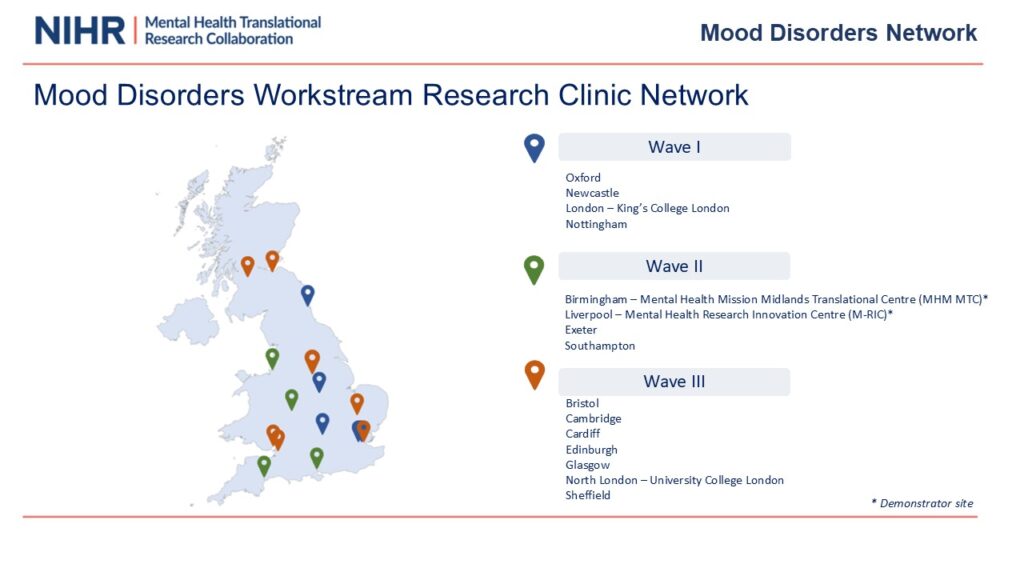Workstream leads

Professor Michael Browning
Professor of Computational Psychiatry, Honorary Consultant Psychiatrist, University of Oxford

Professor Hamish McAllister-Williams
Professor of Affective Disorders, Honorary Consultant Psychiatrist, Newcastle University
Research focus
The Mood Disorders workstream is a nationally coordinated initiative within the Mental Health Translational Research Collaboration (MH-TRC) Mission, focused on advancing clinical research in treatment-resistant depression (TRD), also known as difficult-to-treat depression (DTD). This condition represents a significant challenge in mental health care, with limited access to specialist services and few effective treatment pathways available across the UK.
This workstream aims to establish a network of research-focused clinics that will serve as hubs for clinical studies, enabling systematic investigation into the mechanisms, interventions, and outcomes associated with TRD/DTD. By integrating clinical care with research activity, the workstream seeks to improve treatment options and outcomes for individuals affected by complex mood disorders.
Regional context
The workstream is supported by 15 clinical academic sites across the UK, each contributing expertise and infrastructure to the development of a coordinated national network. These sites include:
- Birmingham: University of Birmingham, Birmingham & Solihull Mental Health Trust and Mental Health Mission Midlands Translational Centre (MHM MTC)
- Bristol: University of Bristol and Avon and Wiltshire Mental Health Partnership NHS Trust
- Cambridge: University of Cambridge and Cambridge and Peterborough NHS Foundation Trust
- Cardiff: Cardiff University and Cardiff and Vale University Health Board. Visit Clinic page: National Centre for Mental Health
- Edinburgh: University of Edinburgh and NHS Lothian
- Exeter: University of Exeter and Devon Partnership Trust. View Clinic page: AccEPT Clinic
- Glasgow: University of Glasgow and NHS Greater Glasgow & Clyde
- Liverpool: University of Liverpool, Mersey Care NHS Foundation Trust and Mental Health Research for Innovation Centre(M-RIC). View Clinic page: Mersey Care Mood Clinic
- London: Institute of Psychiatry, Psychology & Neuroscience at King’s College London and South London and Maudsley NHS Foundation Trust. View Clinic page: National Affective Disorders Service
- Newcastle: Newcastle University and Cumbria, Northumberland, Tyne and Wear NHS Foundation Trust and Northern Centre for Mood Disorders. View Clinic page Care Pathway Enhancement (CaPE) Clinic
- North London: University College London and North London Mental Health Partnership
- Nottingham: Nottingham NIHR BRC and University of Nottingham and Nottinghamshire Healthcare NHS Foundation Trust. View Clinic page: Nottingham Specialist Depression Service
- Oxford: University of Oxford and Oxford Health NHS Foundation Trust. View Clinic page: Depression Research Centre
- Sheffield: University of Sheffield and Sheffield Health and Social Care NHS Foundation Trust
- Southampton: University of Southampton and Hampshire and Isle of Wight Healthcare NHS Foundation Trust. View Clinic page: Mood Disorders Clinic at Hampshire and Isle of Wight Healthcare NHS Foundation Trust.

Wave 1 clinics were set up and assessing patients prior to the MH-TRC Mission. Wave 2 clinics were more newly established or in the process of set up at the start of the MH-TRC Mission and Wave 3 clinics are currently being set up, having been selected following further funding.
This geographically diverse network ensures broad population coverage and facilitates the inclusion of underserved communities in mood disorder research.
Research aims
The primary aim of the Mood Disorders workstream is to develop a coordinated network of research-focused clinics dedicated to TRD/DTD. Specific objectives include:
- Clinic Establishment: Refining models for the delivery of research-integrated mood disorder clinics across participating sites.
- Network Governance: Establishing oversight mechanisms to guide strategic direction, monitor performance, and ensure consistent delivery of research objectives.
- PPIE: There is PPIE representation at both local clinics and network level, to help shape the organisational goals and ethos of the network itself as well as the operational reality of the individual clinics.
- Expansion and Inclusion: Increasing the reach of clinics to underserved regions and communities, enhancing recruitment and representation in clinical studies.
- Data Infrastructure: Implementing standardised data collection tools across the network, including demographic, clinical, biological, and cognitive data, to support robust and scalable research.
These work packages are designed to build a sustainable infrastructure for mood disorder research and to support the development of personalised treatment approaches.
Impact
The Mood Disorders workstream is positioned to deliver significant translational impact by improving access to specialist care and advancing the evidence base for TRD/DTD. Participation in research is associated with improved clinical outcomes, and the establishment of dedicated clinics will enable more patients to benefit from cutting-edge interventions.
The network will also serve as a national resource for training the next generation of clinical researchers in mood disorders, fostering expertise and innovation across the UK. By integrating clinical care with research, this workstream contributes to a future where treatment for mood disorders is more effective, equitable, and informed by high-quality scientific evidence.
More details about ongoing workstream initiatives can be requested from Mary Wilson, Mood Disorders Workstream Project Manager.


